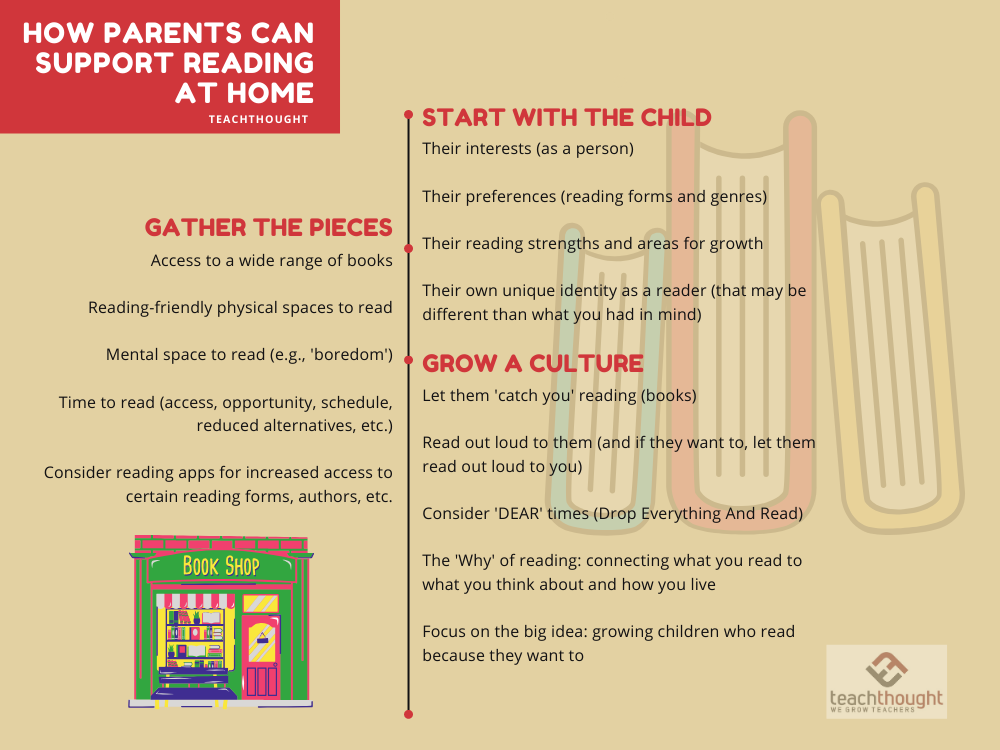
How Can Parents Help With Reading At Home?
by Terry Heick
While efforts in school to promote literacy and a love of reading are crucial, the most powerful forces that create lifelong readers begin and end at home.
This is true for many reasons, few more obvious than home is where students came from long before they set foot in your classroom, and home is where they will return when your time with them is done. In Why Students Should Read, I approached this from another angle.
“For all of its wonderful intentions, pedagogy is inherently destructive. It seeks to change and reform and mash and refine and alter and reduce and increase. Put another way, focusing on reading-the-verb–the skill as assessed by reading speed and sight vocabulary and main idea extraction and author and purpose and details, and a million other silent efforts readers make in unfolding a text in a way that they can make some kind of sense of it–annihilates reading from the beginning in pursuit of a ‘highly-effective learning environment.’ The assumption is that if one can read, and read well, then they will.”
It’s possible I was a little dramatic there, but the point is that the spirit and aesthetic and humanity of reading both precedes and proceeds the skill of it. With that in mind, below are some ways parents can help support reading at home.
Reading With Parents At Home: What Parents Can Do To Help Their Child Enjoy Reading
1. Start With The Child (As Opposed To The ‘Reading’)
Their interests (as a person)
Their preferences (reading forms and genres)
Their reading strengths and areas for growth
Their own unique identity as a reader (that may be different than what you had in mind): What they read, why they read, when and where they read, etc.
2. Gather The Pieces And Build The Structure For Literacy At Home
Access to quality books to read (ideally physical books but apps like Epic for younger children and Kindle and iBooks for older children can work, too)
Comfortable physical spaces to read (considering lighting, background noise, distractions, etc.) 1, 2
Mental space to read (e.g., ‘boredom’).
Time to read
Have a small toolbox of reading strategies to help them–or help them help themselves
Help them learn to choose books that they can and ideally will enjoy reading
3. Grow A Culture
For younger books, find books that you can read together (choral reading, take turns reading, etc.)
Talk to them (like a friend) about what they’re reading
Let them ‘catch you’ reading (books, not your phone)
Read out loud to them (and if they want to, let them read out loud to you)
For hesitant readers, honor and and explore why some students think they dislike reading
Consider ‘DEAR’ times (a scheduled or spontaneous time during the day where everyone in the house–without exception–‘Drops Everything And Reads’; this can be done for 10 minutes at a time at first and grown from there) 2
Sometimes, just sit with them while they read without talking (though you can read if you’d like). This communicates that reading is important–and while it may annoy’/distract older students, you’re not sitting there with them for long. Further, this could have the effect of reinforcing reading as ‘their space’ and ‘their time.’
Explain the backstories of books: Why authors wrote certain books, how some books were responses to other books, that some books were once banned, etc.
The ‘Why’ of reading: connecting what you read to what you think about and how you live
Do everything you can not to force them to read–and if you do have to force them at times, work over time to reduce external motivation
Focus on the big idea: growing children who read because they want to versus being told or otherwise externally motivated to
1 How necessary this is depends on what spaces are already available. Generally, a distraction-free space with a chair is plenty, and a couch or their bed or the front porch or deck–anywhere they’re comfortable and as distraction-free as possible should work.
2 You can also consider using a background noise for reading played through the headphones or even a larger set of room speakers.
3 Whether or not you should ‘schedule’ reading at home depends on so many factors–not the least of which is how you ‘frame’ and market that reading time to the kids and how they respond to it and so on–that it’s hard to make a recommendation here. The idea, though, is to not squeeze reading into a schedule already bursting from activity and instead create opportunities (as organically as possible) for that to happen.
What Parents Can Do At Home To Help With Reading

